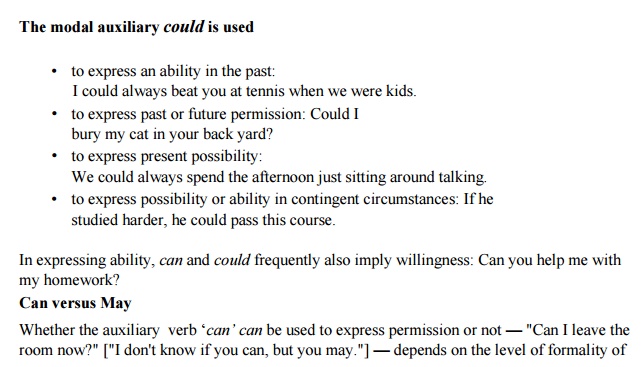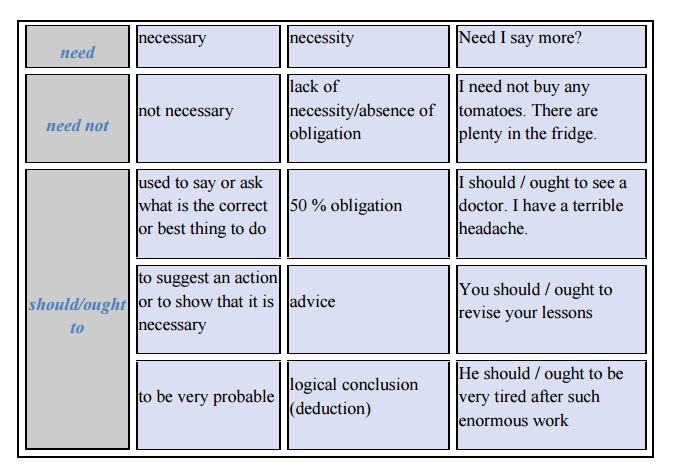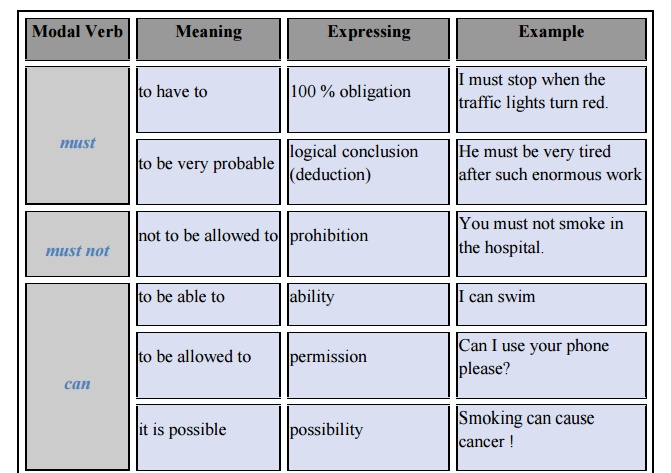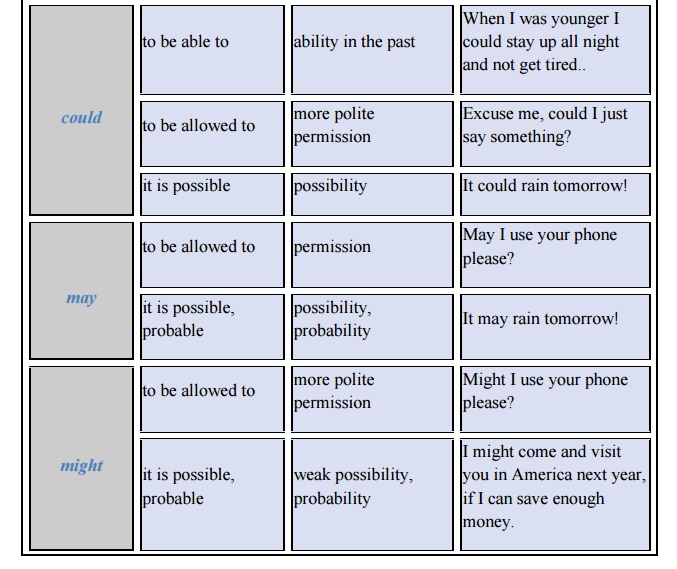Chapter: English
Modal Verbs
MODAL VERBS
Some
helping verbs, called modal auxiliaries
or modals, such as can, could, may, might, must, ought to, shall, should, will, and would, do not change form for different
subjects. For instance, try
substituting any of these modal auxiliaries for can with any of the subjects listed below.
(singular) He can write well.
We, you
,They (plural)
There is
also a separate section on the Modal
Auxiliaries, which divides these verbs into their various meanings of
necessity, advice, ability, expectation, permission, possibility, etc., and
provides sample sentences in various tenses. See the section on Conditional Verb Forms for help
with the modal auxiliary would. The
shades of meaning among modal auxiliaries are multifarious and complex.
Uses of Can and Could
The modal auxiliary can is used
to express ability (in the sense of being able to
do something or knowing how to do something):
He can speak
Spanish but he can't write it very well.
to expression permission (in the sense of being
allowed or permitted to do something): Can I talk to my friends in the library
waiting room? (Note that can is less
formal than may. Also, some writers will object to the use of can in this context.)
to express theoretical possibility:
American
automobile makers can make better cars if they think there's a profit in it.

your text
or situation. As Theodore Bernstein puts it in The Careful Writer, "a writer who is attentive to the
proprieties will preserve the traditional distinction: can for ability or power to do something, may for permission to do it.
The
question is at what level can you safely ignore the "proprieties."
Merriam-Webster's Dictionary, tenth edition, says the battle is over and can can be used in virtually any
situation to express or ask for permission. Most authorities, however,
recommend a stricter adherence to the distinction, at least in formal situations.
Uses of May and Might
Two of
the more troublesome modal auxiliaries are may
and might. When used in the context
of granting or seeking permission, might
is the past tense of may. Might is
considerably more tentative than may.
May I
leave class early?
If I've
finished all my work and I'm really quiet, might I leave early?
In the
context of expressing possibility, may
and might are interchangeable present
and future forms and might + have + past participle is the past form:
She might
be my advisor next semester.
She may
be my advisor next semester.
She might
have advised me not to take biology.
Avoid
confusing the sense of possibility in may
with the implication of might, that a
hypothetical situation has not in fact occurred. For instance, let's say
there's been a helicopter crash at the airport. In his initial report, before
all the facts are gathered, a newscaster could say that the pilot "may
have been injured." After we discover that the pilot is in fact all right,
the newscaster can now say that the pilot "might have been
injured" because it is a hypothetical situation that has not occurred.
Another example: a body had been identified after much work by a detective. It
was reported that "without this painstaking work, the body may have
remained unidentified." Since the body was, in fact, identified, might is clearly called for.
Uses of Will
and Would
In
certain contexts, will and would are virtually interchangeable, but
there are differences. Notice that the contracted form 'll is very frequently used for will.
Will can be used to express
willingness:
I'll wash
the dishes if you dry.
We're
going to the movies. Will you join us?
It can
also express intention (especially in the first person):
I'll do my exercises later on. and prediction:
specific:
The meeting will be over soon.
timeless:
Humidity will ruin my hairdo.
habitual:
The river will overflow its banks every spring.
Would can also be used to express
willingness:
• Would you please take off your
hat?
It can
also express insistence (rather rare, and with a strong stress on the word
"would"):
Now you've ruined everything. You would act that way. and characteristic
activity:
customary:
After work, he would walk to his home in West Hartford.
typical
(casual): She would cause the whole family to be late, every time.
In a main
clause, would can express a
hypothetical meaning:
• My
cocker spaniel would weigh a ton if I let her eat what she wants. Finally,
would can express a sense of
probability:
• I
hear a whistle. That would be the five o'clock train.
U se of Shall and Should
Mainly
used in American English to ask questions politely (it has more usages in
British English). For the future tense, will is more frequently used in
American English than shall.
Shall we dance?
Shall I go now?
Let’s drink, shall we?
Often
used in formal settings to deliver obligation or requirement:
You shall abide by the law.
There shall be no trespassing on this property.
Students shall not enter this room.
Often
used in auxiliary functions to express an opinion, suggestion, preference, or
idea:
You should rest at home today.
I should take a bus this time.
He should be more thoughtful in the decision-making
process.
Used to
express that you wish something had happened but it didn’t or couldn’t
(should +
have + past participle):
You should have seen it. It was really beautiful.
I should have completed it earlier to meet the
deadline.
We should have visited the place on the way.
Used to
ask for someone’s opinion:
What should we do now?
Should we continue our meeting?
Should we go this way?
Where should we go this summer?
Used to
say something expected or correct:
There should be an old city hall building here.
Everybody should arrive by 6 p.m.
We should be there this evening.
Use of Must
Must doesn’t change its form, whatever
be its tense or the number and person of its subject. It can refer to the present or future.
You must
do this now. (Present)
He must
pay damages. (Future)
You must
file a petition. (Future)
Must can refer to the past only when
it is used with the present perfect of the main verb.
She must
have gone home. (Here must refers to the past time because it is used with
the present perfect of the verb go.)
She must
have reached home. (Past)
Uses of must
Must is used to express ideas such as
compulsion, obligation or duty. It is much
stronger than should.
We must love
our country.
They must
recognize our rights.
He must pay
the fine.
Must can be used to talk about
necessity.
We must
get up early.
I must
improve my writing skills.
Must we go
now?
Must can express probability or
logical certainty.
She must
have already left.
He must
be mad to do this.
Oh, there is the door bell; that must be the postman.
To signify strong determination
I must
go now, whatever happens.
Use of Ought
Ought is different from other auxiliary
verbs: it is followed by a
to-infinitive.
Uses of ought
Ought expresses ideas such as duty, necessity and moral obligation. It is not as forceful as must, but it is stronger than should.
You ought to
be punctual.
We ought to
help the poor.
You ought to
visit your friends once in a while.
Ought generally points to present and
future time. It can point to past time when it is followed by the perfect infinitive (have + past participle).
You ought to have helped him. (It was your
duty to help him but you didn’t.)
Uses of Used
to
The auxiliary verb construction used to is used to express an action
that
took
place in the past, perhaps customarily, but now that action no longer
customarily takes place:
We used
to take long vacation trips with the whole family.
The
spelling of this verb is a problem for some people because the "-ed"
ending quite naturally disappears in speaking: "We yoostoo take long
trips." But it ought not to disappear in writing. There are exceptions,
though. When the auxiliary is combined with another auxiliary, did, the past tense is carried by the
new auxiliary and the "-ed" ending is dropped. This will often happen
in the interrogative:
Didn't
you use to go jogging every morning before breakfast?
It didn't
use to be that way.
Used to can also be used to convey the
sense of being accustomed to or familiar with
something:
The tire
factory down the road really stinks, but we're used to it by now.
I like
these old sneakers; I'm used to them.
Used to is best reserved for colloquial
usage; it has no place in formal or academic
text.
Uses of Dare
Dare is used both as a principal verb
and as an auxiliary verb.
Dare as a principal verb
As a
principal verb dare is used in the
sense of defy, challenge or face boldly.
Note that the principal verb dare is
followed by an infinitive with to. It also has forms like dares or dared.
She dared to swim across the river.
How does he dare to do it?
Dare as an auxiliary verb
The
auxiliary verb dare is followed by
an infinitive without to. The
auxiliary dare is common in questions and negative sentences. It doesn’t have
forms like dares or dared.
Questions
and negatives are made without do.
He dare not do so. (NOT He dares not do
so.)
She dare not take such a risk. (NOT She
dares not to take such a risk.)
Dare she say that to him?
How dare
he do such a thing?
Notes:
The
expression I dare say is no longer
used with its original force. It now merely means ‘perhaps’.
I dare say he will agree to our proposal.
(=Perhaps, he will agree to our proposal.)
I dare say that she is correct. (=Perhaps she is correct.)
List of modals
Here is a
list of modals:

Related Topics

